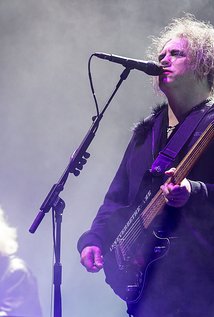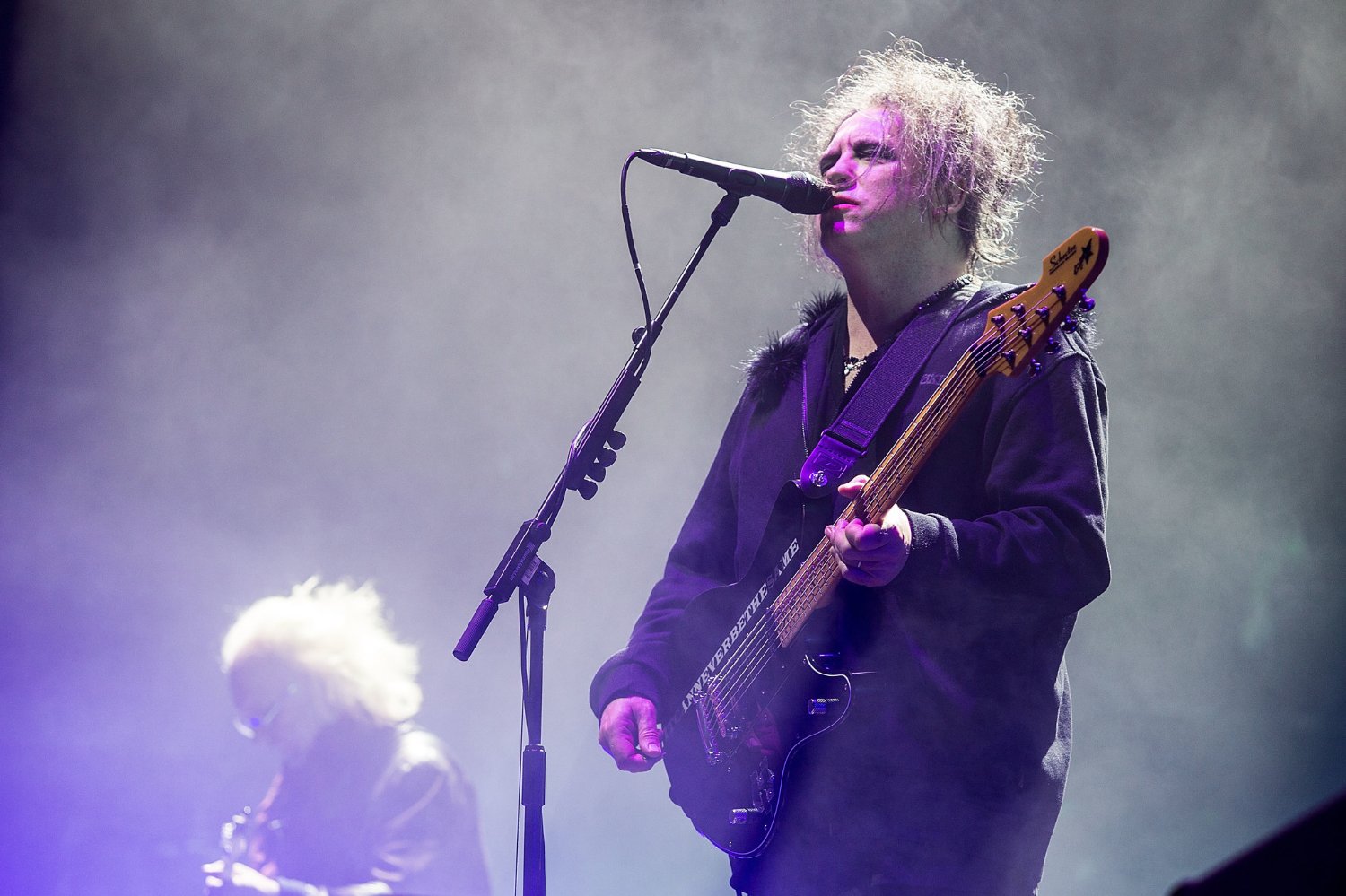Robert James Smith was born 21 April 1959 in Blackpool Lancashire, England to Alex and Rita Smith. He was the third of four children (Richard, 12 July 1946, Margaret, 27 February 1950, and Janet, 30 August 1960). Robert lived in Blackpool until he was three and then his family moved to Horley, Surrey, England where he later attended St. Francis Pri...
Show more »
Robert James Smith was born 21 April 1959 in Blackpool Lancashire, England to Alex and Rita Smith. He was the third of four children (Richard, 12 July 1946, Margaret, 27 February 1950, and Janet, 30 August 1960). Robert lived in Blackpool until he was three and then his family moved to Horley, Surrey, England where he later attended St. Francis Primary school and in March 1966 his family moved once again to Crawley Sussex, England, where he then attended St. Francis Junior School until 1970 where he spent two years at a middle school called Notre Dame which was an experimental school whose teaching methods were supposed to be revolutionary. From 1972 to 1977 he attended St. Wilfrids Comprehensive School where he also met Mary - the girl who would become his wife and also the inspiration behind so many of The Cure's songs.In 1976 The Easy Cure was formed by Robert Smith, Michael Dempsey, Lol Tolhurst and Porl Thompson. It wasn't until 1978 that the band dropped Easy from the name - because Robert thought it sounded too Hippy/East Coast. Porl Thompson also left, as unfortunately the old name had been his idea. After rejecting the German record label, Hanza, The Cure met Chris Parry and decided to give Polydor a chance. It turned out that Parry was in the process of creating a record label of his own, and wanted The Cure to be the first on it's roster. So the new label, Fiction, was born and as well as signing up - The Cure even played a part in naming it.In 1979 the single Killing and Arab was released and was soon followed by the band's debut album Three Imaginary Boys. While touring around the UK two more singles were released; Boys don't Cry and Jumping Someone Else's Train. By the end of the year Michael had left the band and was replaced my Bass Guitarist Simon Gallup, and keyboardist Matthieu Hartley. In 1980 the new four piece produced the dark, minimalist album titled Seventeen Seconds. This featured the band's first major cult classic single, A Forest. After touring Matthieu left the band and then there were three. 1981 saw the release of the somewhat funereal but enchanting album Faith. Though not a single, it's title track remains a mainstay of live performances and is highly regarded amongst fans to this day. It is also one of Robert's own personal favourites.1982 saw the production of The Cure's 4th studio album - Pornography. The tour which followed was cut short in Berlin, due to complete disintegration of the band. Robert and Simon had a punch-up in a bar. This resulted in Robert going home and not talking to Simon for a year. Robert and Lol continued to record material - which led to the creation of the single Lets Go To Bed. 1983 saw the release of Japanese Whispers basically a compilation album of the singles produced by Robert &Lol. In 1984 the band expanded to include base guitarist Phil Thornalley, drummer Andy Anderson and lead guitarist Porl Thompson. The Top was the first album resulting from this new line-up. Robert Smith would later describe The Top as being more like a solo album than a Cure album. This was followed by The Cure's first live album - Concert. This featured recordings from the band's 1984 UK tour. 1985 saw the departure of Phil and Andy, but the return of Simon Gallup. There was also a new addition - drummer Boris Williams. The 1985 album was titled The Head On The Door. This launched a massive tour, for the first time including the US. The band's commercial success exploded as a result. Following this, a compilation album of all the band's singles spanning the past decade was released in two formats. Simply titled Staring At The Sea (CD) & Standing On A Beach (vinyl LP). In 1986 The Cure released their concert film The Cure In Orange, directed by Tim Pope. This amazing performance was filmed live at the perfectly preserved Roman amphitheatre in Orange, Provence. Robert managed to cause much excitement by revealing his newly cropped hair on stage. In 1987 after months of recording in Miraval (France) & Nassau (Bahamas), The Cure unleashed the adventurous, flamboyant and beautiful double album Kiss Me Kiss Me Kiss Me. This featured the newly acquired keyboardist Roger O'Donnell - poached from The Psychadelic Furs. The music video for the single Just Like Heaven features a very special appearance by Mary.1988 was a year for members of The Cure to take a break and get married. On 13th August that year, Robert married his childhood sweetheart Mary Poole in a private ceremony at Worth Abbey, Sussex. In the autumn of 1988 work started on the recording of demos for the next album. Sadly during this time Lol Tolhurst was dismissed from the band, due to the devastating extent of his alcoholism, which had caused his input to taper off completely. The recording sessions between autumn 1988 & early 1989 would result in the creation of The Cure's most iconic, timeless, successful and inspirational album to date. In May 1989, The Cure released Disintegration. During early 1990 after a relatively short time with the band, Roger left and a former roadie, Perry Bamonte, was welcomed in. Perry would double up as guitarist and keyboardist until Roger's return in 1995. In 1990 Mixed Up was released, which was a compilation album of various remixes.In 1991 The Cure won their first Brit Award. That same year they took part in the Great British Music Weekend at London's Wembley Arena. The band released a documentary video titled Play Out, which basically chronicled their 1991 UK tour & performances. In 1992 The Cure released Wish. This was their most commercially successful album in the UK and came in at No.1 on the US Billboard chart. Following the release of the album, the band launched the massive Wish tour. During the US leg of the tour, the band made their second concert film - Show. It featured a mix of their performances from two nights at the Palace of Auburn Hills in Michigan, Detroit. This film and it's soundtrack [a 2-CD set also titled Show] were released in 1993. That same year another live album was released titled Paris. In 1994 the band produced music for the score of The Crow, in the form of the song Burn. They also released two different cover versions of the Jimmy Hendrix song Purple Haze. It was also that year Lol Tolhurst took the band to court, disputing ownership of the band's name. He was unsuccessful and the lengthy process was a drain on both sides - not just financially. Robert took no pleasure in defeating his old friend.In 1995 The Cure found themselves looking for a new drummer, after the sudden departure of Boris Williams in 1994. The band placed an anonymous advert in the newspaper. It read "Very famous band seeking new drummer - No metalheads." Jason Cooper answered the advert and successfully passed the audition. Roger O'Donnell returned as the band's main keyboardist. The band contributed music for the Judge Dredd soundtrack. The song was titled Dredd Song. The band spent several months during 1995 - 1996 recording songs for their new album. They chose to hire a residential studio in St Catherine's Court, Bath. Out of those recording sessions came Wild Mood Swings. Wild Mood Swings was exactly what it said on the tin, and was hugely successful in Europe and the US.In 1997 the band released their second singles compilation - Galore. This featured all the band's singles from the last 10 years. A compilation of the band's music videos from the same period was also released - also titled Galore. The same year Robert contributed a song for the X-Files soundtrack titled More Than This. This song would later be included in the 4-disc set Join The Dots, released in 2004. Robert also made a guest appearance [as himself] on an episode of South Park - one of his favourite programs. Also in 1997 Robert was invited by David Bowie to perform onstage with him at his 50th Birthday Celebration in Madison Square Garden, New York. 1997 saw The Cure's first collaboration with guitarist Reeves Gabrels on the single Wrong Number. Robert Smith also recorded the track Yesterday's Gone with Gabrels for Gabrels album Ulysses.1999 was spent recording songs for the new album Bloodflowers. Once again the band were back at St Catherine's court, but this time there were also sessions at RAK Studios in London. Bloodflowers was released in 2000 and was followed by the extensive Dream tour. The album was very well recieved and won a Grammy Award. In late 2001, The Cure released their Greatest Hits album. This featured singles from 1979 to 2001. The box set included a DVD of the corresponding music videos and a cd featuring newly recorded acoustic versions of all the singles. The singles from 2001 being Cut Here & Just Say Yes. The original version of Just Say Yes featured Saffron, from the band Republica. She is also in the music video.In 2002 The Cure were very busy. They played several concerts, kicking off with a particularly spectacular performance in London's Hyde Park, to a crowd of 20,000. This was followed by a concert in Belgium. Finally in November, The Cure played two nights at the Tempodrome in Berlin. These were the legendary Trilogy concerts. Both concerts were captured by HD cameras and the best of both were released as a 2 DVD set. The Trilogy shows were live performances of three albums in their entirety: Pornography, Disintegration & Bloodflowers. These three albums, Robert felt were some how bound together. Robert's inspiration to perform Trilogy came from seeing David Bowie perform his album Lodger.
Show less «




